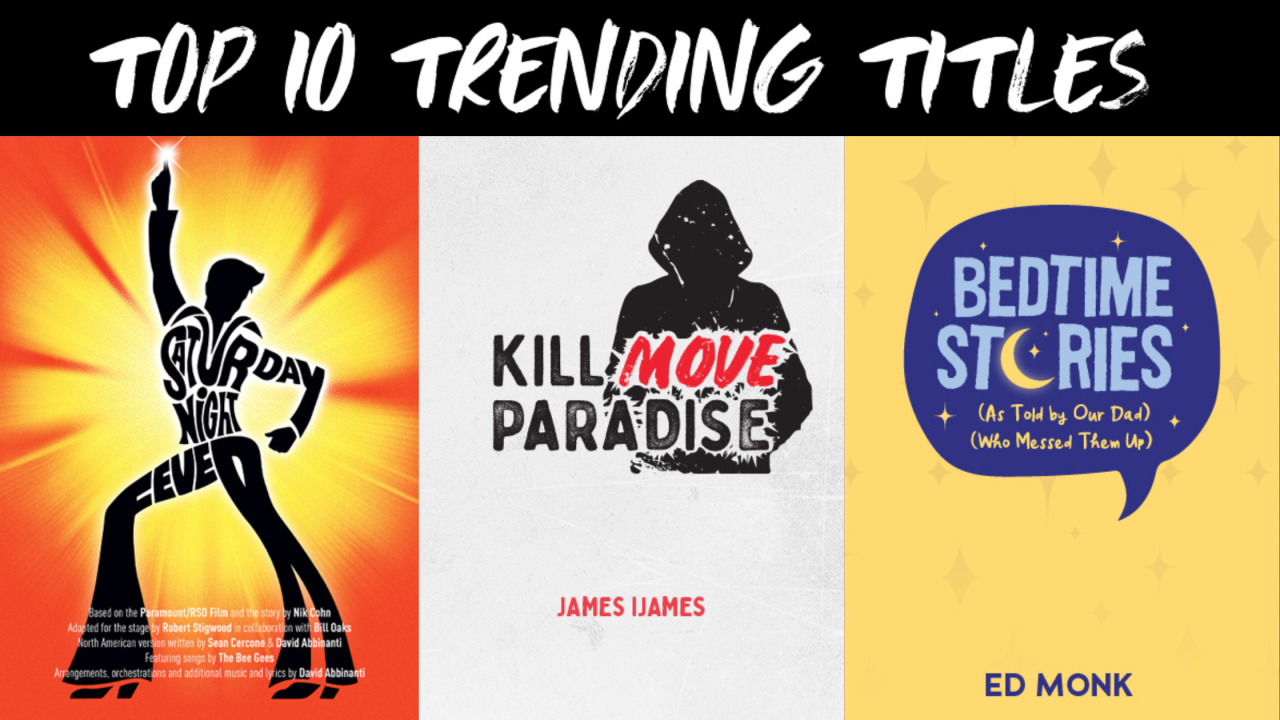What’s hot at Broadway Licensing Group? Check out the top trending titles of the week from Broadway Licensing, Dramatists Play Service, and Playscripts.
Saturday Night Fever The Musical story by Nik Cohn, adaptation by Robert Stigwood, Bill Oaks, North American adaptation by Sean Cercone and David Abbinanti
THIS STORY: In this beloved ’70s throwback, Tony Manero, a nineteen-year-old Brooklynite paint store clerk, spends his weekends at a local disco, where he moonlights as the king of the dance floor. When he and mesmerizing dancer Stephanie enter a dance competition, the pair’s professional partnership blossoms into a deep friendship, and challenges both to reflect on what’s important in life amidst rising social tensions and disillusionment. Featuring the timeless hits of the Bee Gees and classic disco tracks, this reimagined version of Saturday Night Fever transports you back to the era of disco balls, platform boots, and white suits. Burn, baby, burn!
Kill Move Paradise by James Ijames
THE STORY: Four black men find themselves stuck in a waiting room for the afterlife. As they attempt to make sense of their new paradise, Isa, Daz, Grif, and Tiny are forced to confront the reality of their past, and how they arrived in this unearthly place. Inspired by the ever-growing list of slain black men and women, KILL MOVE PARADISE illustrates the potential for collective transformation and radical acts of joy.
Wait Until Dark by Frederick Knott
THE STORY: A sinister con man, Roat, and two ex-convicts, Mike and Carlino, are about to meet their match. They have traced the location of a mysterious doll, which they are much interested in, to the Greenwich Village apartment of Sam Hendrix and his blind wife, Susy. Sam had apparently been persuaded by a strange woman to transport the doll across the Canadian border, not knowing that sewn inside were several grams of heroin. When the woman is murdered the situation becomes more urgent. The con man and his ex-convicts, through a cleverly constructed deception, convince Susy that the police have implicated Sam in the woman’s murder, and the doll, which she believes is the key to his innocence, is evidence. She refuses to reveal its location, and with the help of a young neighbor, figures out she is the victim of a bizarre charade. But when Roat kills his associates, a deadly game of cat and mouse ensues between the two. Susy knows the only way to play fair is by her rules, so when darkness falls she turns off all the lights leaving both of them to maneuver in the dark until the game ends.
Bedtime Stories (As Told by Our Dad) (Who Messed Them Up) by Ed Monk
THE STORY: It’s Dad’s turn to tell his three rambunctious kids their bedtime stories, but when he gets fuzzy on the details, the classics get creative: a prince with a snoring problem spices up The Princess and The Pea, The Boy Who Cried Wolf cries dinosaur instead, and Rumpelstiltskin helps turn all that pesky gold into straw. You may think you know your fairy tales, but not the way Dad tells them.
A Christmas Carol (Baizley) adapted by Doris Baizley
THE STORY: A highly inventive adaptation of the classic Dickens story, pared down to its essential elements. In this version, we encounter a company of traveling players about to enact the Dickens story. As the on-stage trunk of supplies opens, actors and clowns spill out and roll on. The gruff stage manager and prop boy check the show’s props, which are shabby and third rate, but the troupe improvises by creating a magical world of make-believe. The acting troupe soon discovers that the actors playing Scrooge and Tiny Tim have abandoned the tour; but the show must go on, and the prop boy eagerly volunteers for the part of Tim while the cynical stage manager must be forcibly drafted to play the old miser. The troupe proceeds to make their way through the tale, creating fog, snow, fire and ghosts through mime, imagination and wonderful visual effects. The rag tag players (including the stage manager and prop boy) quickly become the characters of the story, and we are pulled into the life of Ebenezer Scrooge. The Christmas Spirits work their magic and warm the heart of Scrooge, as well as the old stage manager. This is an extremely effective and easily produced version of this Christmas classic.
All My Sons by Arthur Miller
THE STORY: During the war Joe Keller and Steve Deever ran a machine shop which made airplane parts. Deever was sent to prison because the firm turned out defective parts, causing the deaths of many men. Keller went free and made a lot of money. The twin shadows of this catastrophe and the fact that the young Keller son was reported missing during the war dominate the action. The love affair of Chris Keller and Ann Deever, the bitterness of George Deever returned from the war to find his father in prison and his father’s partner free, are all set in a structure of almost unbearable power. The climax showing the reaction of a son to his guilty father is fitting conclusion to a play electrifying in its intensity.
‘Night, Mother by Marsha Norman
THE STORY: The scene is the living room/kitchen of a small house on an isolated country road, which is shared by Jessie and her mother. Jessie’s father is dead; her loveless marriage ended in divorce; her absent son is a petty thief and ne’er-do-well; her last job didn’t work out and, in general, her life is stale and unprofitable. As the play begins Jessie asks for her father’s service revolver and calmly announces that she intends to kill herself. At first her mother refuses to take her seriously, but as Jessie sets about tidying the house and making lists of things to be looked after, her sense of desperate helplessness begins to build. In the end, with the inexorability of genuine tragedy, she can only stand by, stunned and unbelieving, as Jessie quietly closes and locks her bedroom door and ends her profound unhappiness in one fatal, stunning and deeply disturbing moment—a moment never to be forgotten by those who have witnessed, and come to understand, her plight.
Graceland and Asleep on the Wind by Ellen Byron
THE STORIES: GRACELAND. The place is the front entrance of Graceland, the late Elvis Presley’s Memphis mansion, the time, five o’clock in the morning, three days before the estate is to be opened to the public. Two ardent Presley fans, Bev and Rootie, are camped out before the gates, each determined to be the first to enter the sacred precincts. Bev is a bewigged, middle-aged lady with too much make-up and a brassy down-home style; Rootie is young and shy and somewhat intimidated by the raucous Bev. Wary at first, the two soon progress from dispute to shared confidences and a growing compassion that, in the end, moves the essentially warm-hearted Bev to defer the place of honor to her waif-like and touchingly sincere rival. (2 women.)
ASLEEP ON THE WIND. The time is ten years before the time of GRACELAND, the place, a small clearing in Bayou Teche, Louisiana, the “special place” that Rootie refers to in the other play. This is where Rootie and her favorite brother, Beau, a handsome, sensitive and restless young man of thirty come to talk in private and to escape her other brothers, two high-spirited hot rodders who seem to delight in pestering their shy, reclusive sister. This time Beau has a double purpose for their meeting: to persuade Rootie to try to stick it out at home and in school and to reach beyond him for companionship; and also to tell her that he has enlisted in the army and has requested service in Vietnam. Inevitably the news comes as a deep shock to Rootie, but it is the way of its telling that makes the play so touching and evocative—and that in the end allows Rootie to accept the fact that her life, for better or worse, will never again be the same. (1 man, 1 woman.)
Watch on the Rhine by Lillian Hellman
THE STORY: Concerns an idealistic German who, with his American wife and two children, flees Hitler’s Germany and finds sanctuary with his wife’s family in the United States. He hopes for a respite from the dangerous work in which he has been involved, but his desire for personal safety soon comes into conflict with the deeply held beliefs that have made him an active anti-Nazi. In the end his conscience cannot be compromised, and he returns to Germany and the resistance movement—and to what will be, most certainly, his ultimate destruction. Told in compelling, human terms, the play is an eloquent and stirring tribute to the brave men and women who, despite all odds, struggled early on to stem the tide of fascism which was soon to spread throughout Europe and the world.
Epiphany (Watkins) by Brian Watkins
THE STORY: On a snowy January night, Morkan invites her friends and family to her home in upstate New York to celebrate a forgotten tradition: Epiphany. Except the guest of honor is late, and no one can quite remember what the holiday is meant to signify—Is it religious? Secular? Should there be dancing? As the evening wears on, the group becomes uneasy, wanting answers to questions both big and small: What is the best way to spend one’s time on this earth? And why is this night so important to the hostess?





